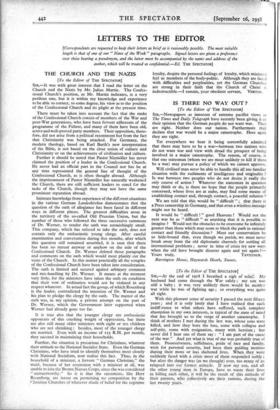THE CHURCH AND THE NAZIS
LETTERS TO THE EDITOR
[Correspondents are requested to keep their letters as brief al is reasonably possible. The most suitable length is that of one of our "News of the Week" paragraphs. Signed letters are given a preferencs over those bearing a pseudonym, and the latter must be accompanied by the name and address of the author, which will be treated as confidential.—Ed. THE SPECTATOR]
[To the Editor, of THE SPECTATOR]
Sta,—It was with great interest that I read the letter on the Church and the Nazis by Mr. Julius Martin. The Confes- sional Church's position, as Mr. Martin indicates, is a very perilous one, but it is within my knowledge and experience to be able to correct, to some degree, his view as to the position of the Confessional Church and its plight at the present time.
There must be taken into account the fact that the ranks of the Confessional Church consist of members of the War and post-War generations, who have been fervent adherents of the programme of the. Fiihrer, and many of them have been old, active and well-proved party members. Their opposition, there- fore, did not arise from a political resentment but from the fact that Christianity was being attacked. For Germany, the modern theology, based on Karl Barth's new interpretation of the Bible, is not based on the close union of culture and Christianity or on the achievements of civilisation and culture.
Further it should be noted that Pastor Niemoller has never claimed the position of a leader in the Confessional Church. He never had an official part in the Council nor has he at any time represented the general line of thought of the Confessional Church, as is often thought abroad. Although the imprisonment of Pastor Niemoller has naturally weakened the Church, there are still sufficient leaders to stand for the tasks of the Church, though they may not have the same prominent reputation abroad.
Intimate knowledge from experience of the different situations in the various German Landeskirchen demonstrates that the question , of the oath of allegiance has been faced in different ways in different places. The greatest difficulties arose in the territory of the so-called Old Prussian Union, but the number of those who followed the three successive summons of Dr. Werner, to render the oath was astonishingly small. This company, which has refused to take the oath, does not contain only the enthusiastic young clergy. After careful examination and conversation during five months, after which this question still remained unsettled, it is seen that there has been no retreat anyway or anyhow on the side of the Confessional Church. Dr. Werner deleted those paragraphs and comments on the oath which would most plainly cut the veins of the Church. In this matter practically all the scruples of the Confessional Church have been taken into consideration. The oath is limited and secured against arbitrary comment and mis-handling by Dr: Werner. It means at the moment very little, for the ministers have taken the oath on condition that their vow of ordination would not be violated in any respect whatever. In actual fact the group, of which Rosenberg is the leader, contradicted the intention of Dr. Werner and his plan to pledge the clergy by the oath. The matter of the oath was, in my opinion, a private attempt on the part of Dr. Werner, which the Government later supported when Werner had already gone too far.
It is trite also that the younger clergy are enthusiastic opponents of this crushing weight of oppression, but there are also still many older ministers with eight of ten children who are not shrinking ; besides, most of the younger clergy are married. Even with an income of 125 R.M. per month, they succeed in' maintainingtheir households.
Further, the situation is precarious for _Christians, whatever their attitude to the National Socialist State. Even the Gernian Christians, who have tried to identify themselves most closely with National Socialism, now realise this fact. Thus, in the household of a minister, k fervent "German Christian," the maid, because of her connexion with a minister at all,. was unable to join the Brown Nurses Corps, since she was considered
untrustworthy." So it is that the extremists, like Herr Rosenberg, are intent on permitting no competition by the _ Christian Churches of whatever shade of belief for the supreme loyalty, despite the personal feelings of loyalty, which ministers feel as members of the body-politic. Although they are faced with difficulties and perplexities, yet the German Churches are strong in their faith that the Church of Christ Is indestructible.—I remain, your obedient servant, VERITAS.










































 Previous page
Previous page